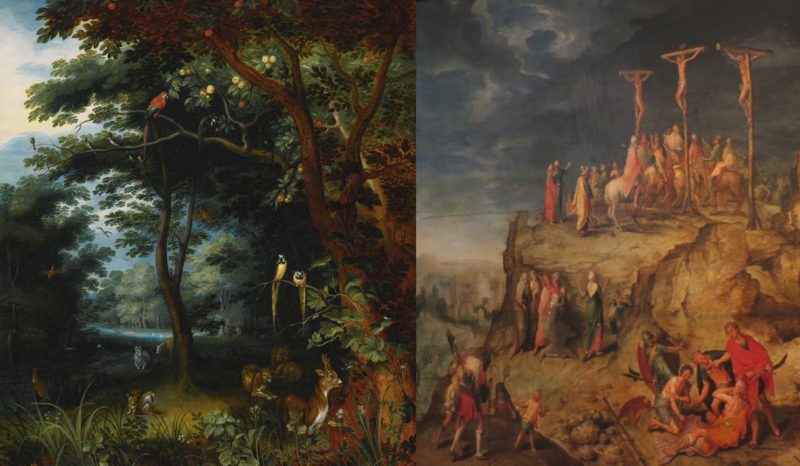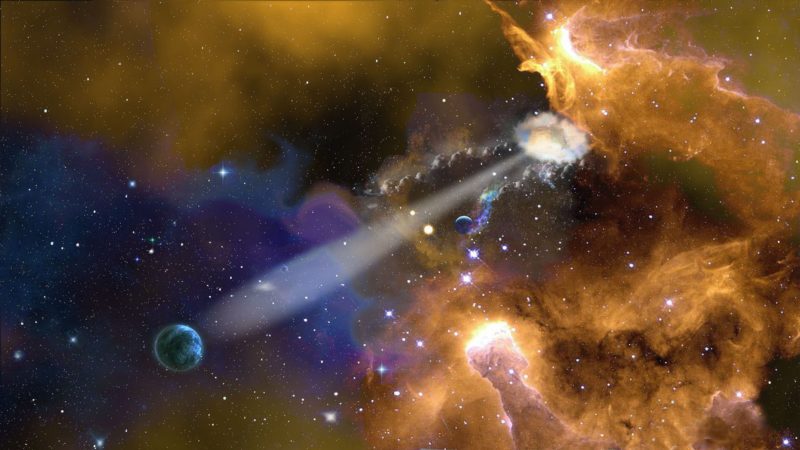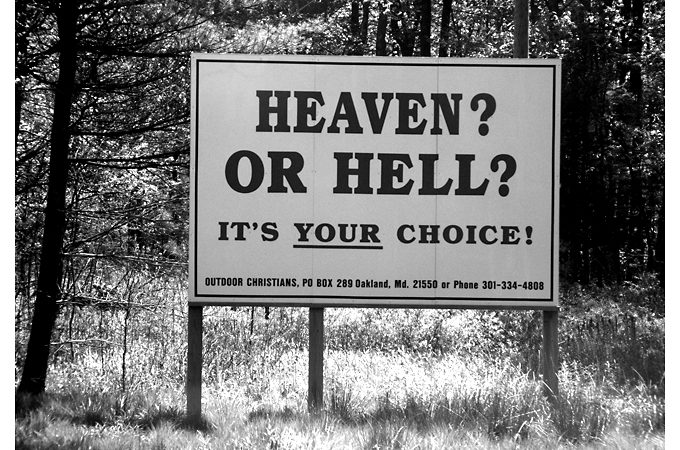Hell exists because of human freedom. Both human freedom and human responsibility are major themes of Scripture. We see this in two trees, one in each testament.
The Old Testament speaks of the tree in the midst of the garden. This is the affirming place of human freedom. In the New Testament, our freedom is secured at Golgotha’s tree.

The concept and language of human freedom was born in the Bible. It is a “gift of the Jews” to the world, as historian Thomas Cahill has declared. It can be argued that no foundation for freedom or language of freedom is to be found in Hinduism, Buddhism, Islam, nor the world’s animistic religions. Instead, these beget the language of fatalism and human bondage.
Free people will respect their freedom and its source or they will cease to be free.
The theme of free choice launched in Genesis 2 is reaffirmed in the Gospel of John.
For God so loved the world, that He gave His only begotten Son, that whoever believes in Him shall not perish, but have eternal life. For God did not send the Son into the world to judge the world, but that the world might be saved through Him. He who believes in Him is not judged; he who does not believe has been judged already, because he has not believed in the name of the only begotten Son of God. This is the judgment, that the Light has come into the world, and men loved the darkness rather than the light, for their deeds were evil. For everyone who does evil hates the Light, and does not come to the Light for fear that his deeds will be exposed. But he who practices the truth comes to the Light, so that his deeds may be manifested as having been wrought in God. John 3:16-21
This passage is so familiar to Christians. It marks the pivot of all of human history and shows freedom on two levels, divine and human. On the side of the divine, God freely chooses to offer salvation to human beings through the cross where love and justice kiss. Christ freely choose to do the will of the Father by dying on the cross (Luke 22:42). This is God’s gift of grace offered to “whoever believes.”
Human freedom is enshrined in two trees
Note the moral agency of human beings affirmed in this text:
- Whoever believes
- He who believes … he who does not believe
- Men loved darkness rather than light
God’s choice offers man a choice. God’s offer of salvation is placed before “whosoever” to offer men and women a choice to have life eternal or to find death, to love light or choose darkness.
Human freedom is enshrined in these two trees, the tree of the knowledge of good and evil and Golgotha’s tree. In both, God shows His love and mercy and demonstrates that humans are not puppets or automatons, but are free and responsible imago Dei creatures.
As we saw in part 1, Genesis 1 records God bringing light into existence to overwhelm the darkness. Now in John 3 we see light coming into the world in the person of Jesus Christ. As the gospel of John affirms, people choose darkness over light because their deeds are evil. This is another indication of human freedom and its abuse by those who rebel against God.
This radical nature of freedom is found throughout the Scriptures.
- From those who leave the paths of uprightness to walk in the ways of darkness, Proverbs 2:13.
- The way of the wicked is like darkness; they do not know over what they stumble, Proverbs 4: 19.
- I have come into the world as a light, so that no one who believes in Me should remain in darkness, John 12:46.
Which brings us back to Romans 1. For this reason, “God gave them over to” or “abandoned them to” the natural consequences of their choices. Human beings are free to say no to God! And they are free to walk in darkness rather than light. But how profound the consequences of those choices. It is literally to choose hell in time and eternity. We see how the effects of this choice play out in their bodies in the ensuing verses of Romans 1 (24, 26-27, 28b-32).
Human freedom means freedom to choose hell
God is sovereign and man is free, truly free. Man is free to say no to the good, but he cannot live outside the created order. There are natural consequences to saying no! God is God and we are not. We can say no to God and yes to hell, but even in hell we cannot escape God’s presence.
 Where shall I go from your Spirit?
Where shall I go from your Spirit?
Or where shall I flee from your presence?
If I ascend to heaven, you are there!
If I make my bed in Sheol, you are there! (Psalm 139:7-8)
We can say no to God and yes to hell, but our choices do not change ultimate reality. In The Great Divorce, C.S. Lewis portrays hell as a shrinking place where shrinking human beings revel in their rebellion, hatred and anger. They exist for themselves and with themselves forever.
Every pagan deity enslaves, diminishes our humanity, and opposes God’s intentions for us. God is the God of freedom. He sets us free, by grace, to be fully human, to become all He intends for each of us to be.
Rankin summarizes the message of his book this way: “Heaven is for the many who love mercy, hell is for the few who guard bitterness.”
There are only two kinds of people in the end, those who say yes to God and His Grace and those who say yes to bitterness and hell.
Say no to hell! Say yes to grace!
- Darrow Miller






